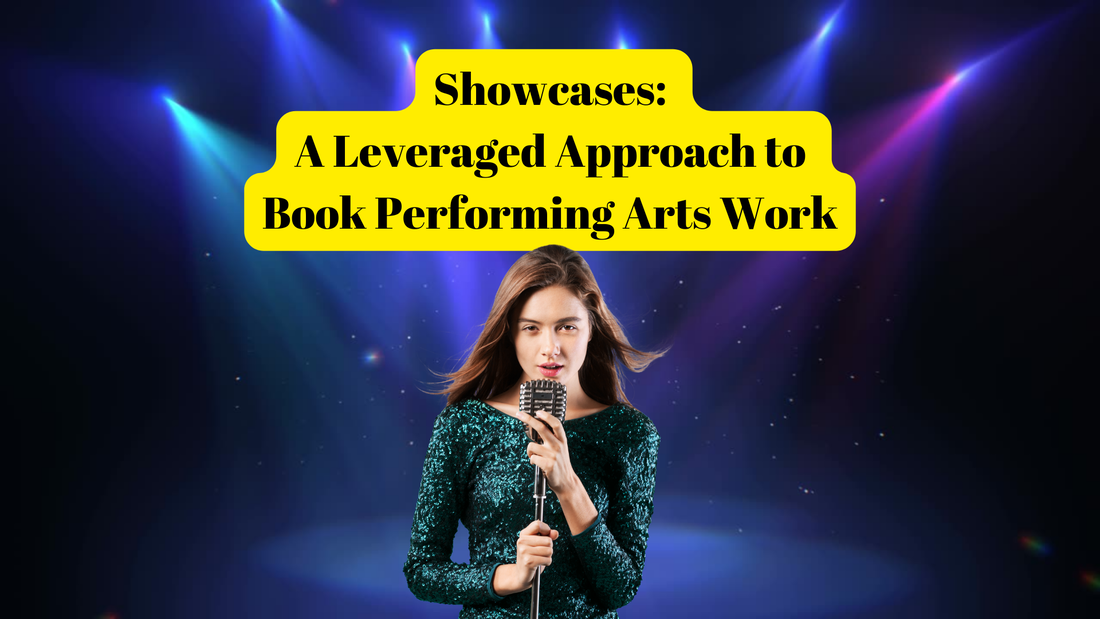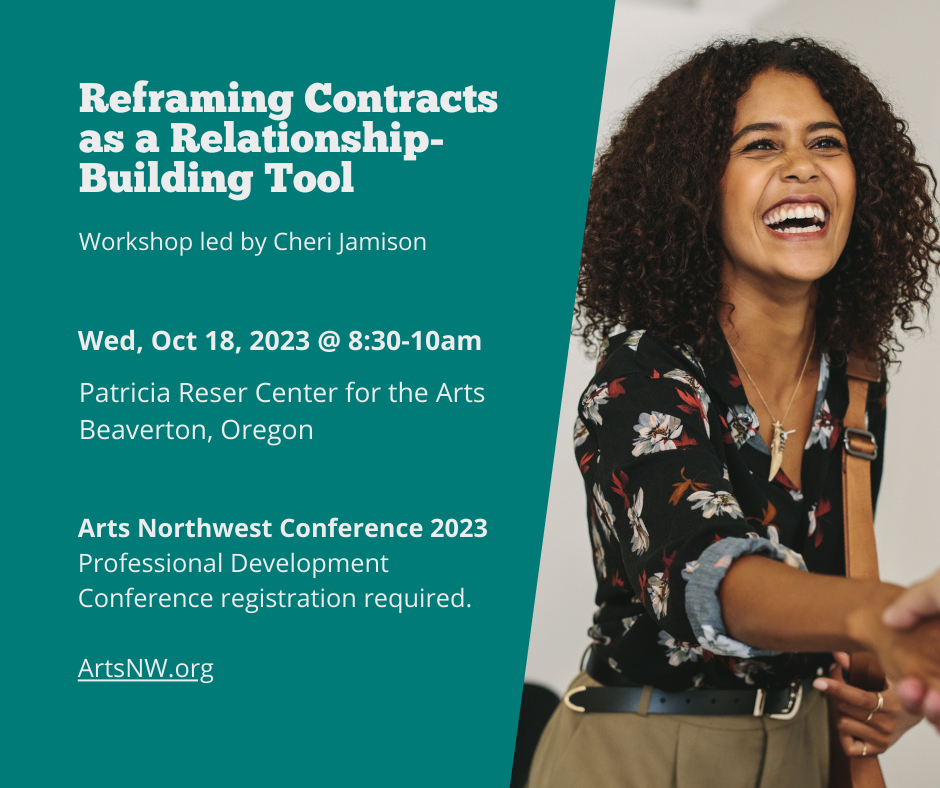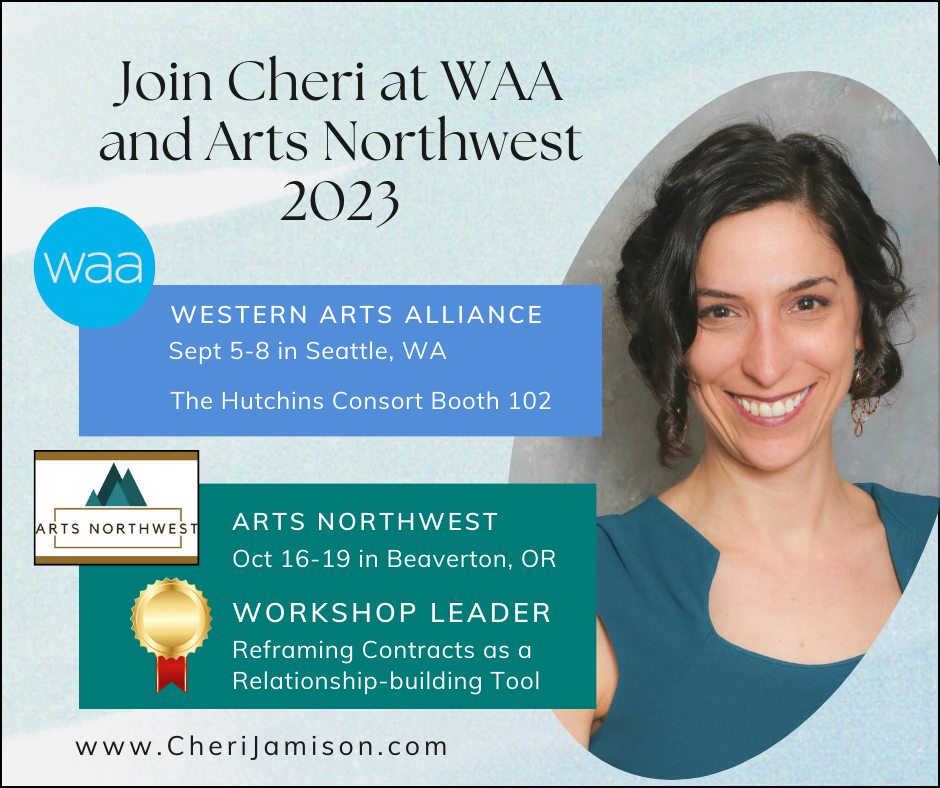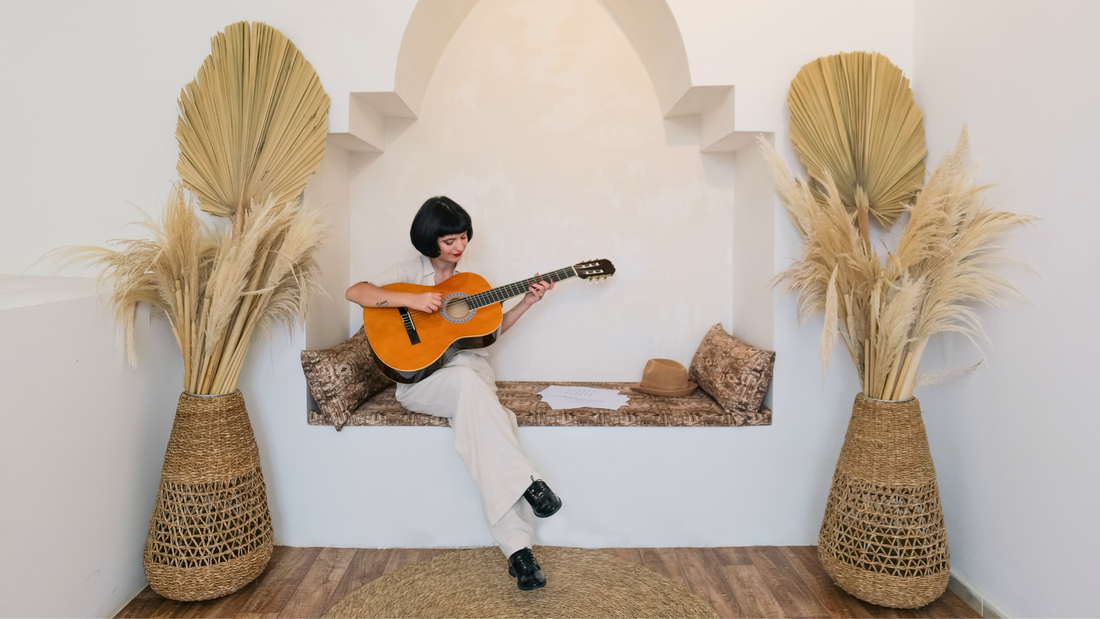|
Showcases make a difference to everyone who participates in the professional performing arts sector. Whether you’re a self-represented artist, agent, manager, presenter, or arts service organization that puts on conferences, live showcases (both juried and independent) are a key component to how business happens. If an artist or group is “Tour Ready,” showcases are a strategic investment and leveraged approach to increase your chance of booking work and touring. If your application to showcase is accepted, you have the opportunity to present your talent in front of a targeted audience, including industry professionals, presenters (usually the talent buyers), and decision-makers. But you must be prepared for this make-or-break chance financially, organizationally, and artistically. Let's explore the significance of showcases and the steps to make the most of this valuable platform. What are Showcases and Why are They Important? There are two main kinds of showcases: juried and independent. Juried showcases are curated performances that provide a platform for performing artists to exhibit their talents in front of a targeted audience of presenters, promoters, and other talent-buyers… in other words, people who hire artists! Think of a super professionally produced talent show where each act gets 12-15 minutes to shine. Since these acts are chosen by a highly competitive adjudication process (more on that below), those who make it to that stage are generally considered ready to tour professionally. Independent showcases are also short performances held in hotel conference rooms and/or hotel rooms, typically later in the evening after all the other conference events are complete (8pm-midnight or later). Often independent showcases can be “stacked,” meaning there are multiple artists performing in different rooms at any given time. Independent showcases need a different marketing/ presenter outreach strategy because artists won’t have the dedicated time in the conference schedule for all the presenters to attend like during juried showcases. Why Showcases Matter to Presenters Presenters are at these conferences to do business. In other words, they are shopping for talent to fill their seasons or series at the venue they represent. Showcases offer a condensed and impactful way for presenters to see many artists perform live, which is generally a prerequisite for booking a deal together. Conferences are also about discovery. Presenters are always building their list of artists to hire, either now or in the future. If a presenter hears about an artist with buzz, artists who fit the kind of profile or genre that they’re looking for, or gets a personal invitation, that presenter may attend a showcase to see that artist perform live. But time is short and there are many artists. If it’s an independent showcase, there’s no guarantee a presenter will stay for a full thing – they may have only time to hear one song – that’s why each showcase performance must be air tight in terms of preparation. How Do Showcases Help Me Book Work? For a booking agent, manager who does booking, or self-represented artists who are filling that booking role for themselves, getting a showcase is a big deal and huge opportunity. If an artist gets a juried showcase slot, there’s a much higher likelihood of getting serious leads from presenters for booking that artist. Unfortunately, there are no guarantees of getting work. The best you can do is be prepared and create the best possible environment for booking to happen. Each showcase presentation should include an announcement with information on how to reach the booking person for that artist. If presenters like the artist, but don’t know who to contact, that could be a lost opportunity. Agents, managers, and self-represented artists need to be prepared with short-term reminders about the showcase such as a postcard or one-sheet that can be handed to the interested presenters. You also need a system to capture and track which presenters are interested so you can follow up. Follow-up, follow-up, follow-up! How Do I Get a Showcase? What Do I Need to Have Prepared? Pre-Production: As a foundation, even before you consider applying for a showcase, artists and booking representatives must have everything ready for serious booking conversations with presenters. This includes, but is not limited to: excellent promotional materials, tour date availability (typically 1-2 years in advance), tech and hospitality riders, artist fees, tour budgets, program information, etc. Research Opportunities: Identify showcases that align with your artistic style, goals, and target audience. Showcases typically align with performing arts conferences, festivals, or specialized showcase events throughout the year. These tend to follow a yearly cycle, so if you miss this year, plan ahead for next year. Apply: Follow the guidelines outlined in the showcase application process, including submission deadlines, fees, and required materials. Typically a group of industry professionals (often agents, managers, and presenters) will volunteer to be on the review committee for showcases. It is highly competitive to get in, sometimes hundreds of applications for maybe 25 juried showcase spots, so these adjudicators may only spend a few minutes reviewing each application. With that in mind, your application materials need to be just as honed as your prospective showcase. Prepare A Showcase-Ready Performance: Showcases generally include 3 songs or 3 distinct presentations of your performing art for a total of 12-15 minutes. Creating this set is an art and strategy in and of itself. Rehearse extensively, paying attention to the flow and technical aspects of your performance to ensure a flawless presentation. Whether you are accepted to showcase or not in any particular conference, preparing your showcase-ready set is key to booking work now or in the future and is well worth the time. If all of this feels overwhelming, it’s okay... It's just that you may not be ready yet for this step in your professional life, but you can work toward it as a milestone in your business. Save time, money and heartache in the long run by taking a strategic approach and get clear about how showcases fit within the larger direction of your creative career or business. If you want support to get showcase ready, I can help. Click the button below to set up an initial consultation with me (free of charge) so we can discuss your goals. As a recap, showcases are a key part of how the performing arts sector does business. Artists reach their most targeted demographic of talent buyers, booking agents and managers gain the warmest leads, and presenters experience what artists can do live so they can fill their venues with excellent acts now or in the future. By understanding the mechanics of showcases, preparing meticulously, and leveraging the opportunity effectively, artists can make the most of any showcase opportunity as a key stepping stone to a flourishing career in the performing arts.
P.S. It’s the Start of Showcase Application Season for Fall 2024 Conferences! Western Arts Alliance (WAA) showcase applications due March 4, 2024 at 5pm PT - More info: www.westarts.org/showcase Arts Northwest (ANW) showcase applications due April 26, 2024 - More info: https://iwanttoshowcase.ca/43rd-annual-arts-northwest-conference-2024 I Want To Showcase - Online portal for showcase submissions for several performing arts conferences. https://iwanttoshowcase.ca *** Want help getting yourself or your artists showcase ready? Contact me for a free initial consultation here: www.calendly.com/cherijamison/network Cheri Jamison is an Arts Consultant with over 12 years of experience in the arts and nonprofits. Cultivating a non-judgmental, solution-oriented environment, Cheri meets her clients wherever they’re at with their business or creative career. The focus of Cheri Jamison Consulting LLC is strengthening organizations from the inside out through capacity-building, executive coaching, board training, and professional development. www.CheriJamison.com In the world of performing arts, contracts are often viewed as boring but necessary legal documents, outlining the terms and conditions of a professional engagement. While they certainly serve this purpose, contracts can also be powerful tools for building and nurturing relationships within the industry.
As Vice President of Operations of a music booking agency, contracts were a huge part of my day-to-day work. I executed close to 450 contracts during the course of my two years with that company and a wide variety of deals for live performances (universities, performing arts centers, concert series, festivals, clubs, etc). Often, I'd have to negotiate or renegotiate with presenters to include greater protections or make the terms more balanced (e.g., with the Force Majeure clause) while also maintaining good professional relationships. I learned this was a key opportunity that, if done well, could deepen the relationship. In this article, we will explore how re-framing your mindset around contracts can transform these documents into invaluable instruments for fostering trust, strengthening interpersonal connections, and ultimately ensuring the long-term success of artists and organizations alike. The Traditional View of Contracts Traditionally, contracts have been seen as dry legalese, binding agreements designed primarily to protect the interests of both parties involved. They outline the obligations, responsibilities, and compensation for each party, leaving little room for flexibility or interpersonal considerations. This conventional approach often results in a transactional relationship, where artists and organizations interact out of necessity (or with uncomfortable power struggles) rather than genuine collaboration. 💡 Artists, if you don’t already have and use a standard contract, please do! It speaks volumes about your professionalism and how you run your business as a musician or artist group. Shifting the Paradigm To harness the full potential of contracts as relationship-building tools, it's essential to shift the paradigm. Instead of viewing contracts solely as legal documents, consider them the foundation upon which to build a robust, trusting, and mutually beneficial partnership. 1. Clear and Transparent Communication Effective interpersonal skills are at the core of successful contract negotiations. It begins with open and honest communication. Each party should have a clear understanding of their roles, expectations, and objectives. Take the time to engage in meaningful conversations, addressing concerns and questions openly. This fosters an environment of trust and understanding from the very beginning. 💡 Practical Tip: Presenters, if you know your contract has non-negotiable terms out of your control (common with government or university contracts) or requirements that may entail the artist having additional insurance, mention it in your conversations upfront or consider including a short bullet list in your deal memo before sending the full contract. This will give your counterpart a heads-up and build goodwill, even if there are terms you cannot change. 2. Collaborative Problem-Solving Negotiations and contracts often have an inherent tension because both sides are looking out for their own people, resources, etc. Instead of approaching these conversations and clauses with a combative mindset, view them as opportunities for collaborative problem-solving. Avoid manipulative sales tactics because most people can smell them a mile away. Be mindful of the tone you want to set in the conversation, and do your best to have a calm confident intention that you both will be able to work out a mutually beneficial solution. Most importantly, cultivate the mindset that the partnership is more important than any individual deal. “Don’t think of it as us vs. them,” as my friend and professional leadership coach, Lisa Husseini, describes negotiation, “but rather imagine you are both on the same side, standing shoulder to shoulder, turned in the same direction looking at the issue and asking yourselves, How do we make this work?” When conflicts arise, work together to find solutions that meet both parties' needs and maintain the integrity of the partnership. This approach can strengthen the bond between presenters, agents, artists and organizations. 3. Flexibility and Adaptability In the dynamic world of performing arts, unforeseen circumstances can disrupt even the most carefully planned engagements. As we witnessed during the COVID-19 pandemic, invoking the “Force Majeure” clause, where both parties cease all legal obligations if something happens outside anyone’s control that causes cancellation, can be absolutely devastating financially and to the relationship. Presenters, agents, and artists may discuss alternative provisions that allow for more flexibility and adaptability. This works best when included in the initial negotiation conversations rather than after receiving the initial contract document. You could approach it by talking about your organizational values or saying, “This is how we like to work with our partners when it comes to cancellation and Force Majeure circumstances.” When both parties are willing to accommodate reasonable changes, such as rescheduling or discussing what it would take to make each party whole, it demonstrates a commitment to the partnership's success rather than rigid adherence to contractual terms. 💡 Resource: Building Ethical and Equitable Partnerships in the Performing Arts, by the Association of Performing Arts Professionals (APAP). 4. Mutual Respect and Empathy One of the most powerful tools for building relationships is the practice of mutual respect and empathy. Recognize that artists and organizations are individuals with unique needs and aspirations. Show empathy by understanding their perspectives and challenges. This humanizes the contractual process, making it more about collaboration than compliance. The Trust-Building Continuum Building trust is a gradual process that extends far beyond the signing of a contract. A relationship-focused approach requires ongoing effort to nurture and maintain trust throughout the engagement. If you have a team, it’s important to train them because they are an extension of you in that partnership. Here are some strategies to consider: Consistent Communication Stay connected throughout the project, providing updates and feedback regularly. Make an effort to check in with each other and address any concerns promptly. Consistent communication demonstrates your commitment to the partnership's success. Deliver on Promises Meeting or exceeding the expectations outlined in the contract is crucial. When both parties consistently deliver on promises, trust deepens, and the relationship becomes more solidified. Celebrate Successes Acknowledge and celebrate milestones and achievements together. These moments of shared success can strengthen the emotional connection between artists and organizations. Learn from Challenges When challenges arise, view them as opportunities to learn and grow together. A relationship built on trust can withstand setbacks and become even stronger through adversity. In conclusion, re-framing contracts as a relationship-building tool can revolutionize how presenters, agents, and artists collaborate. But we can’t wait for others to do it. Change begins with our own commitment. Start within your own business or organization by updating your own contract with more equitable language and talking to your professional partners about why you’re making those changes from a values-led place. This shift not only enhances the quality of artistic productions but also creates a supportive, thriving, and more equitable ecosystem within the performing arts community. In our relationship-based industry, let's use every interaction—especially contracts—as a way to showcase our professionalism and strengthen our connections. *** This article is inspired by a workshop that Cheri will be presenting at the 2023 Arts Northwest Conference on Wednesday, Oct 18, 2023. For more information on the conference, please visit: artsnw.org/workshops As the leaves start to turn and the air carries a hint of autumn, the performing arts world gears up for one of its most exciting and crucial times of the year: conference season. This is when artists, agents, and presenters come together to showcase their talents, forge new partnerships, and shape seasons at performing arts centers, festivals, and concert series.
I just returned from the first of several large booking conferences (Western Arts Alliance) and I will be a workshop leader at another arts conference next month (Arts Northwest). In this blog post, we'll take a closer look at conference season, how business is conducted between agents and presenters, and what artists can expect. *** The Essence of Conference Season Conference season typically spans several months, with events and gatherings taking place in various locations, both physical and virtual. These conferences are organized by industry associations, such as the Western Arts Alliance (WAA), Association of Performing Arts Professionals (APAP) and the International Society for the Performing Arts (ISPA), to name a few. They serve as a melting pot for professionals from all corners of the performing arts world, including artists, agents, presenters, producers, and more. The Heart of Business: Agents and Presenters At the core of conference season lies the intricate dance between agents and presenters. Agents, representing artists or performing companies, aim to secure bookings and partnerships with presenters, who are responsible for programming performances in venues, festivals, and theaters. These meetings are where the magic happens, where artistic visions meet practical logistics, and where future collaborations take shape. Be mindful that presenters are booking for the upcoming season, not the current one, so there may be months or even year+ between when the conference takes place, the deal is made, and when the actual performance takes place (and you get paid). What to Expect as an Artist For artists, conference season is a whirlwind of opportunities and a chance to gain exposure on a broader scale. Here's what you can expect:
Conference season is an exciting and crucial period in the performing arts world. It's a time when artists, agents, and presenters come together to shape the future of performing arts entertainment. As an artist, conference season offers a unique opportunity to showcase your talent, connect with industry professionals, and pave the way for future collaborations. Embrace this season with enthusiasm, be well-prepared, and remember that patience and persistence can go a long way in building a successful career in the performing arts. Whether you're a seasoned performer or just starting out, conference season can be a game-changer for your career. *** Want help navigating conference season? Need help figuring out if it’s a good investment for your music career? I can help with that. Send me a message and we’ll set up a time for a free consultation. Recently, I received a cold email outreach from a classical guitarist. The body of the email was short—just two YouTube video links with one sentence descriptions each, then the sign-off from this artist’s assistant (maybe manager?). I didn’t know who this assistant was or the performer.
It took me about 10 seconds to read, but I had no idea why this person had emailed me or what to do with it... so I deleted the email. How many performing artists unintentionally sabotage their chances of getting hired because they don’t stop to think about the person on the other end of the communication? There are a few key things I’ve learned in my time as Vice President of Operations for a music booking agency, career coach for performing artists, and arts nonprofit consultant: You will get better results if you 1) do your homework, 2) be prepared, 3) speak to the other person’s needs and 4) always have a call to action. *** When I was at the music agency, we would frequently receive inquiries from artists looking for representation. Unfortunately, many of these emails would just end up in an email folder to be reviewed later, if ever. Why? Because we only did a roster review about once per year, between performance seasons. Because 95% of the time, we only added new artists to our roster after one of our agents saw them perform or showcase live. Because, at the time, each person in our agency received 100–200 actionable emails PER DAY related to our current work. In short, email inquiries to get an agent (at least at our agency) were an ineffective strategy. (Though we did receive a very memorable one where the lady had badly Photoshopped her head onto supermodel bodies, which did garner some attention and laughs, but we would never take that artist seriously.) Generally speaking, the fact that we did not respond had nothing to do with the talent of those artists but with the time constraints and procedures in our own company. Whenever possible, I would acknowledge receipt of the artist’s email and let them know about our timing and process for review. That kind of communication, however, is very rare. But as an artist, how would you ever know that? All you experience on the other end of the email is radio silence. Especially if you’ve put a lot of time and effort into an email campaign, it can be very frustrating. Which brings me to my practical suggestions: 1) Do your homework. Take the time to learn about the person or organization you’re wanting to reach. Trust me, it will save you time in the long run. Have you reviewed the organization’s website to make sure that person still works there? Are they the correct person in the organization to handle your request? Are you spelling their name correctly? Are you using their correct pronouns? To go even further, IF this is an organization that you’re seriously interested in, is email the best way to connect with them? Or is there a better way to engage them to start a relationship (such as by networking with them in person at a conference)? This kind of research and preparation can be tedious, yes, but if you do it, your efforts will give you a clear edge. Otherwise, you risk turning off the very people you’re trying to engage. 2) Be prepared. Before I dive into this one, a little context and mindset reminder: Most artists feel disempowered when they do outreach, but it’s important to remember that as a performing artist, you are a small business owner. You are providing a service, and the person you’re reaching out to is either your direct client (presenters, venue owners, talent buyers) or someone you may want to hire as part of your team (in the case of an agent or manager). Some questions to ask yourself or research may be: What do you know about their business and business model? Do you know how you fit into it? In other words, what can you do for them? How would you make them money? Understanding your value within the creative economy can help you feel more equal in the power dynamic. Do you have all your ducks in a row to be ready to start working with them if they say yes? (i.e., an organized press kit with high-quality pictures, videos, and other marketing materials.) Being prepared and organized sends the signal that you will be professional and easy to work with. That goes a long way in this industry. 3) Speak to their needs. When you’re prepared and ready for the communication, whether in person or by email, frame your words in a way that speaks to their needs and centers their world (not yours), using their vocabulary ideally. This is a key for just about any kind of sales or marketing communication. What problem do you solve for them? How do you make their job or life easier? You may not be saying those words exactly, but if you know what they care most about, then you can speak to that need. Clearly state what benefit you are bringing them and why you think you’re a good fit for their venue or organization. Is it a mixed use venue, such as a bar, looking for bands to draw an audience? Then have the stats from your last several similar gigs and say, "When I played at x location, I consistently drew in X% more than the venue’s usual patrons, and the owner said the audience stayed significantly longer on nights I played." If you don’t have those stats or testimonials, ask for them. If you’re reaching out to potential agents or managers, you need to have some kind of self-represented touring history to prove you have a career for them to manage. They will be evaluating you based on how well they think they can sell you to their clients (likely bigger presenters/talent buyers). Having press testimonials, stats, high-quality materials, funding for touring, and a healthy audience or social media platform will all work in your favor. A lot of this is about being as prepared as possible, which will be self-evident if you have that in place. If you speak to their needs in the communication as well, it shows you understand their world and the interdependent business partnership you are inviting them to consider. 4) Always have a call to action. Chances are, the folks you are emailing are busy. Help save them time by telling them what to do next (in a nice way). Across many industries, this one piece of advice is universal: always have a clear call to action (CTA). In other words, what do you want them to do? Want them to book you? Get to the point about why they should, then tell them what action to take. Your CTA may be a button that says something like "Bring xyz to your stage" or "Book now" with a link that auto-generates an email. Or for a slightly softer call to action, say "Learn more" and link to your website, but be sure to also include appropriate contact information in case they want to hire you. Be careful to not include too many live links, otherwise your email will end up in their spam folder. In a competitive field, do everything you can to give yourself that extra edge. Don’t make the mistake of sending a pitch email without doing your homework, being prepared, speaking to their needs, or having a clear call to action. Otherwise, your email may end up deleted in 10 seconds, like the one in my inbox earlier this week. *** What has worked well for you when sending artist outreach emails? If it’s something you avoid or feels frustrating, what gets in your way? Leave a comment or message me directly! Cheering you on, Cheri Prior to my 20-year high school reunion last fall, I pulled out my high school scrapbook. I found an interview of me in the school newspaper as a senior, about to graduate and pursue a career in the performing arts…
I see the picture of myself clearly: A lanky young woman with a brilliant smile and shoulder length brown hair, straight like the A’s on her report card. She has spent four years hyper-focused on building a resume to get into a good music school, thinking that was the ticket to her future as a professional singer. She did it wholeheartedly. Time outside of school was devoted to voice lessons, piano lessons, dance lessons, rehearsals for countless performances and even competing in a beauty pageant! The interviewer asked, “Why did you choose to become involved and pursue this as a career?” “Performing gives me joy and gives joy to others. What could be a better reason?” That joy fueled me, but I was ambitious, too. Film, media, and magazines showed me the shiny lives of celebrities as well as the starving-artist-to-success story. Even though I intellectually understood only a few artists reached that level, I was confident I would be one of them. Little did I know what the biggest cost would be…. I pursued a career in music as I think many of us do. I had talent, a love for music, and a dream. I was lucky enough to have people who believed in me, who saw my potential and supported me. They wanted to see my name in lights, too. My parents paid for all kinds of lessons and my basic needs, which provided the gift of time for all these pursuits. Like most kids, I didn’t have any real concept of what that all actually cost or what a gift that was. Again, I was (naively) convinced just getting into a good music school was my shoe-in for a professional career. When I was in college at USC’s Thornton School of Music studying opera, I did not learn much of the business side of music. The course of study was very technique focused to make us into the best possible performers, how to audition well, and be prepared when we were cast in opera roles. How the music industry worked wasn’t part of the general curriculum for my major, so I didn’t think it was necessary. The underlying belief was: If you’re good enough, talented enough, and work hard enough, then you’ll get discovered and everything will fall into place. Tactically, I was taught a narrow prescribed path: first you do this, then you do that, then with a dash of luck, a lot of hard work, you’ll have a career… but there are no guarantees. We did have masterclasses with working professional singers who would provide a little more insight into the lifestyle, but the advice felt very piecemeal. I remember at the time thinking, “Geez, that doesn’t sound very good. I’m not sure I really want to do that.” Immediately the whirlwind of internal commentary started: After investing so much time, effort and money, how could I possibly choose anything different? How could I disappoint everyone who’s believed in me and invested in me? It would be like betraying my own dream! When I graduated, it felt like a great accomplishment, but I honestly had no idea what to do next. I experienced a full-blown identity crisis post-college. My school support structure was gone. It was clear to me now a good music school wasn’t a guarantee for work or a career. I wasn’t even sure what kind of music career I wanted any more. I knew I still loved to sing. I knew I needed to audition to get work, but how do I find that? What did they say about agents again? All the standard young-adult-launching-into-the-real-world anxiety was really hitting me. I got an office job which paid my bills, but not much else. I learned my creativity tanked when I felt stressed about the rent. Then I had the brilliant idea to start a business that would pay for all my needs and give me plenty of time to do my music. Easy, right? I consumed a crazy amount of information and training on entrepreneurship. All along the way, I was pitched more and more programs and services: Get more clients! Earn your first $100K from home! Passive income! Sales, sales, sales!! Not to say that all these folks were selling snake oil; many I found very helpful in some way or another. Was there ever a conversation about return on investment (ROI)? No. Was there anyone who sat me down and said, “Do you have a solid idea for a business? Do you know how you’ll get capital?” No. When I focused on following the steps to “do it right,” it gave me a (false) sense of progress and purpose, but the success I envisioned always felt out of reach. Unknowingly, I had transferred my same mental habits and belief system about pursuing music to pursuing entrepreneurship. I felt disempowered and out of control. There were so many gatekeepers. Paying clients felt like ephemeral creatures. As the inevitable pile of rejections grew, I started doubting, thinking it was something wrong with me. I turned against myself when things didn’t turn out the way I thought they should. I kept searching for answers and solutions. Did I need a new domain name, a different tactic, or another $1,000 program on marketing? If I could just find the linchpin! Maybe if I contorted myself or my content just so, the right people would take notice and my dream would be fulfilled. It’s hard to admit, but I was an artist-consumer. I had an ambitious dream that fueled many of my purchasing decisions, but I didn’t feel like I had real authority over my own career trajectory. It was so much work and I was hustling so hard to start a business that would pay for my life, so I could finally do the thing that brought me joy in the first place. The biggest cost: I didn’t even notice the joy of performing started slipping away. I fully bought into my own judgment that whatever achievements I had in my career thus far, didn’t amount to “making it” in the eyes of the world (which seems to be nothing less than celebrity). This made me incredibly sad and unhappy. It wasn’t until several years later that I truly started to understand the general music ecosystem and the many, many options to participate in the music world. It didn’t have to look just one way. With the help of a career coach, I slowly started reframing what I judged as my past “failures” as meaningful experiences. I started to take a step back, to really think about what I wanted and why, to untangle my identity from my career. I started to think about my life as a whole and put my career in its proper place. For the first time, I gave myself permission to start exploring what success would look like and feel like for me, as I chose to define it. I wanted to feel joy from my singing again and I knew this healing work around my career was an important step. When I mentioned to my coach that I was feeling shut down to my own singing even though part of me really wanted to, he said he could understand exactly why…. “Because you are afraid of hating music.” I was shocked at his calm clarity about something that had evaded me for so long. “When you engage with music, it triggers those bad experiences, and you’re afraid if you keep going down that road, you’ll end up hating music and you couldn’t bear that. Work on uncoupling those bad experiences by saying to yourself ‘Yes, I have had painful experiences AND I love, love, love music.’” I immediately started crying. I do love music; I just hadn’t let myself feel it. I had built a wall up inside me to protect myself for all those years in an extremely tough industry. I had forgotten my response from that school paper interview: Performing gives me joy and gives joy to others. From that point forward, I started to take baby action steps to allow that love to flow again, reclaiming my music for myself. I chose to move in a direction career-wise where I felt more empowered, finally embracing ALL the entrepreneurial skills I’ve built over the years, while still serving the music and arts community I love. I don’t share this story to get sympathy. I share it to illustrate that the multitude of courses and programs teaching the how to’s of a creative career, don’t teach us tools to work *with* our artist nature. Those of us who pursue careers in the arts are probably sensitive people, otherwise we wouldn’t be effective artists. We’re told the moment we hit a bump in the road, “you need thick skin if you’re going to survive this industry.” But thick skin can cut us off the very sensitivity and joy that connect us to our creativity and move our audiences. I suspect many of us just become really good at numbing, ignoring, or hiding that it still stings. Instead, I believe we need to learn to become resilient—to have practical tools and support systems in place, so we can handle our big emotions in a healthy way, especially as we walk along a career path that is often uncertain and uncomfortable. And if you’ve moved away from a creative career because it felt too hard, because your priorities changed, the season of your life changed, or it just happened gradually, all of those are choices that don’t often get acknowledged as valid. Maybe it stopped being fun. Maybe when you saw the realities of the industry, you changed your mind. That’s okay, too. I see so many incredible artists doing good and contributing to their communities who, in deeper conversations, reveal they are unhappy because their career didn’t turn out the way they wanted—their dream unresolved inside of them. Let’s start to normalize the creative hero’s that keep their joy alive as the conductor of their church’s children’s choir, or start a nonprofit to improve access to the arts in their area, or the touring musician who now fights for music-friendly policy in their city. Success doesn’t have to look just one way. As an artist-business owner (vs. artist-consumer), you can choose what that means for you. Joy is now one of my business success metrics. And that joy is a much more sustainable fuel to move through the music world, at least for me. We don't have to suffer for our art. That's an old story. The experience of your music career internally is just as important as the external. When you reclaim your power and joy, your career will also be transformed. This rarely happens, but I got carried away responding to a social media post recently.
In a nutshell, a local organization was posting a call for musicians to perform during a 4-hour time slot. So far so good. Then they said, “Unfortunately, we don't have the funds to pay any of the musical acts. But you get to keep 100% of your tips and we will promote you on [our social media.]” Also known as exposure. Now, I am pretty even-minded most of the time, but this got me riled up. I finally found the words I wanted to share (and maybe not directed at the people you would initially expect). Here’s what I posted, slightly edited and expanded…. There's a lot to unpack here. I think it's a conversation worth having in an ongoing way. My personal opinion is that expecting musicians to perform for free, for tips, or “exposure” is a culturally-accepted attitude that needs to change. Assuming musicians would agree to this kind of arrangement has the unspoken message, “I don’t think what you offer is worth paying for, but I want you to do it anyway. And you should thank me for giving you this opportunity.” Think of the full emotional impact of saying that to someone’s face. It’s devastating, right? You wouldn’t want someone to say that to you. That may not be the message the event planner intended, but it’s frequently the message received. Do this instead, event planners: If your organization really doesn't have a large budget, but you want music at your event, treat a musician just like any other business vendor or sponsor. Acknowledge the value and underlying benefits musicians would bring to the event and negotiate with them in good faith about the budget you do have. Unfortunately, after years of musicians being asked to perform for free, tips, or exposure, sometimes fed misinformation that this is the only way to “get discovered,” many musicians have internalized the message that their talents are worthless. Or worse, it instills a misbelief that they are worthless and sends them into a shame spiral. Navigating a career in music can be quite emotional, yet there is little to no training to learn how to handle situations like this. Musicians who are looking at this "gig" from feelings of financial scarcity and perhaps real need (i.e. "I need whatever cash I can get to make rent."), are basically in fight, flight or freeze mode physiologically. They are in survival mode– and we don't make great decisions from that state. I also think musicians don't always take stock of all the time, money, and effort they've invested into developing their talent and craft. For most of us, it's years and thousands, if not hundreds of thousands of dollars in private lessons, gear, practice time, competitions, schooling, ongoing education, plus years of experience actually performing and refining our craft. Think of it as self-funded capital you’ve put into your business. Your talents add real economic impact for the organizations that want you to perform. Music acts like a magnet and brings people in and keeps people at events and venues. While there are specific circumstances where you might choose to donate your time and talent, it’s not right for others to assume you would do so. An analogy might be: A chef (professional or otherwise) has invested time, money, and dedication to learn their skills. They feed people. They love to feed people. It takes time to put meals together. All the ingredients to make that meal cost that chef their personal money. When an organization asks that chef to bring their food and feed the people that come through that event, it’s commonly recognized that the chef is providing a service with inherent value (economically and personally). Depending on the relationship with that organization, that chef may well decide to donate their services and food to the event. They might be considered an in-kind sponsor and get those benefits accordingly. Musicians deserve to be treated with the same respect as other business owners. I’m sure there are many contributing factors over many years that have led to this generalized attitude towards devaluing musicians and why musicians buy into it.
No matter how this widespread mindset came about, we can work together to change it. If you're a professional musician, please don't perform for free, just tips, or exposure. It makes it harder for the musicians who are trying to charge livable artist fees and get sustainable income. Additionally, you (unconsciously) reinforce the idea that this way of devaluing musicians is okay... and it's not. You teach people how to treat you. Personally, I think many of us are tired of arguing for the value of our work, which because of the personal nature of our work, can feel like arguing for our own value. And that can really do a number on your self-esteem and mental health... especially after years and years. Now, I don't think we should shame others who want music at their events without paying them. However, I think we need to bolster ourselves as a professional music community, adhere to higher standards ourselves, and re-educate people and organizations who make unreasonable and unsustainable asks from musicians (who are self-employed small business owners). Or just say “no” politely if you're not up for a deeper conversation. If you wish you could have those courageous conversations, but feel uncomfortable doing so, or need help finding the words or confidence to do it, I would love to help. As you can tell, I feel very strongly about this topic! As a music and arts professional with training in psychology, and as a performer myself, I want to help change hearts and minds to start valuing music (and music professionals) more. We deserve better. We can change the narrative. Yes, broader society needs re-education, but musicians have to own their value, too... and arguably, first. |
AuthorCheri Jamison is an Arts Consultant with over 13 years of experience in arts and nonprofit management. Cheri Jamison Consulting LLC focuses on strengthening organizations through capacity-building, executive coaching, board training, and professional development. www.CheriJamison.com Categories
All
|








 RSS Feed
RSS Feed